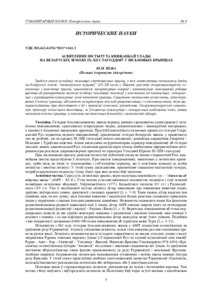Please use this identifier to cite or link to this item:
https://elib.psu.by/handle/123456789/8260Full metadata record
| DC Field | Value | Language |
|---|---|---|
| dc.contributor.author | Кежа, Ю. М. | - |
| dc.date.accessioned | 2015-01-14T14:06:59Z | - |
| dc.date.available | 2015-01-14T14:06:59Z | - |
| dc.date.issued | 2014 | - |
| dc.identifier.citation | Вестник Полоцкого государственного университета. Серия A, Гуманитарные науки : научно-теоретический журнал. - 2014. - № 9. - С. 5-19. | ru_RU |
| dc.identifier.issn | 2070-1608 | - |
| dc.identifier.uri | https://elib.psu.by/handle/123456789/8260 | - |
| dc.description | Consideration Institute of Supreme Power in the Belarusian Lands in IX – the First Half of the XIII Centuries in Written Sources / Ju. Kezha (Polockij Gosudarstvennyj Universitet) | ru_RU |
| dc.description.abstract | Зроблен аналіз асноўных пісьмовых сярэднявечных крыніц, у якіх асвятляюцца інстытуты ўлады на беларускіх землях “далітоўскага перыяду” (ІХ–ХІІ стст.). Паводле разгляду старажытнарускіх ле-тапісных і замежных крыніц, хрысціянскіх літаратурных твораў і заканадаўчых матэрыялаў робіцца выснова аб разнароднасці звестак асобных пісьмовых помнікаў у залежнасці ад палітычных, гістарыч-ных і традыцыйна-культурных умоў напісання крыніцы. Сацыяльна-палітычная рэчаіснасць, адлюстра-ваная ў тэксце крыніцы, абсалютна нехарактэрна для той рацыяналізацыі і сістэматычнасці, якую вы-карыстоўваюць пры даследаванні з’яў і працэсаў сучаснага грамадства. Старажытнарускую сацыяль-ную прастору немагчыма даследваць, не ўлічваючы культурныя і гістарычныя асаблівасці эпохі, умовы напісання тэксту крыніцы, а таксама аксіялагічныя ўстаноўкі і светапогляд аўтара. = The article analyzes the main medieval written sources where institutions are considered the supreme authority in the Belarusian lands in IX–XIII centuries polovіne first. According to ancient chronicles consi-deration and foreign sources, Christian literary works and legislative materials, concludes roznorodnosti in-formation depending on the political, historical and cultural conditions of writing source. Socio-political reality reflected in the text of the source, can not be applied to streamline and systematize that is used in the study of the processes of modern society. Ancient social space can not be investigated without paying attention to the cultural and historical features of the era, the terms of writing the source text, as well as the values and worldview of the author. | ru_RU |
| dc.language.iso | ru | ru_RU |
| dc.publisher | Полоцкий государственный университет | ru_RU |
| dc.relation.ispartof | Веснік Полацкага дзяржаўнага ўніверсітэта. Серыя А, Гуманітарныя навук | be_BE |
| dc.relation.ispartof | Herald of Polotsk State University Series A, Humanity sciences | en_EN |
| dc.relation.ispartof | Вестник Полоцкого государственного университета. Серия A, Гуманитарные науки | ru_RU |
| dc.relation.ispartofseries | Серия A, Гуманитарные науки;2014. - № 9 | - |
| dc.rights | open access | ru_RU |
| dc.subject | Государственный рубрикатор НТИ - ВИНИТИ::ОБЩЕСТВЕННЫЕ НАУКИ::История. исторические науки | ru_RU |
| dc.subject | Источниковедение | ru_RU |
| dc.subject | Гісторыя | ru_RU |
| dc.subject | беларускія землі ІХ–ХІІ ст. | ru_RU |
| dc.subject | княжацкая улада | ru_RU |
| dc.subject | Istoricheskie nauki | ru_RU |
| dc.title | Асвятленне інстытута княжацкай улады на беларускіх землях ІХ–ХІІ стагоддзяў у пісьмовых крыніцах | ru_RU |
| dc.type | Article | ru_RU |
| Appears in Collections: | 2014, № 9 | |
Items in DSpace are protected by copyright, with all rights reserved, unless otherwise indicated.
